First-year class exceeds last fall's by 300+ students
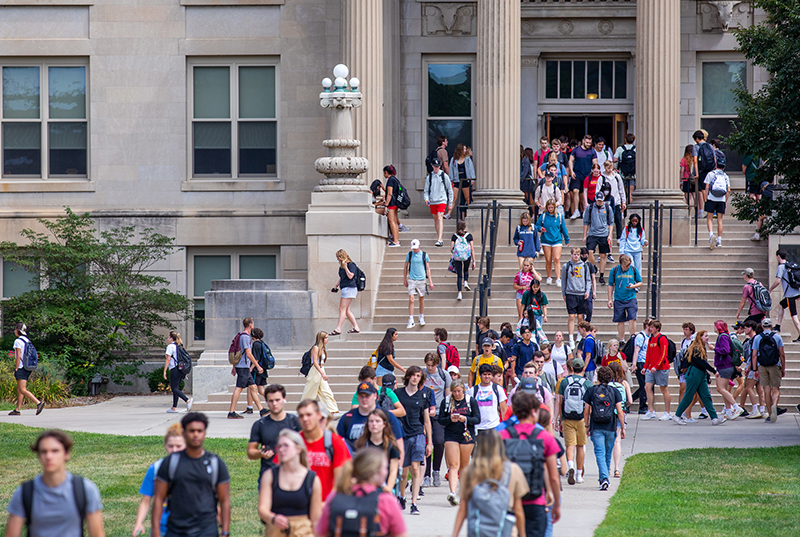
Students pass between classes outside Curtiss Hall on the first day of fall semester. The official fall count is taken on the 10th day of the semester, Sept. 2. Photo by Christopher Gannon.
Oscar Gutierrez debated taking a gap year when he graduated from high school, but after coming to campus for summer orientation, the first-year student from Perry says he knew he belonged at Iowa State.
Gutierrez, a first-generation student in the Ivy College of Business, said earning a scholarship through the Multicultural Vision Program (MVP) solidified his decision. MVP is one of several programs and scholarships Iowa State offers to support first-generation students.
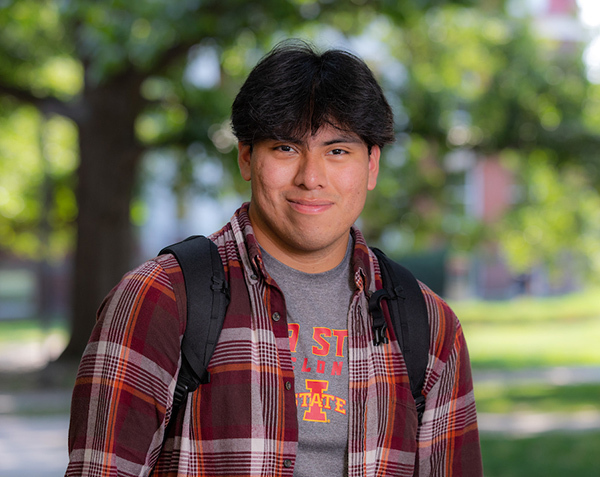
Oscar Gutierrez
Gutierrez said his first semester is off to a strong start.
"Classes are great, the people in my classes make it even better, and I meet someone new every day, so I don't have trouble making new friends," Gutierrez said. "Receiving the MVP scholarship is an opportunity that made the move to Iowa State a lot easier."
This fall, Gutierrez joins a class of 5,728 new first-year students with an average grade point average of 3.71. Iowa State also welcomes 1,383 new transfer students, an increase over last year, and 1,195 new graduate and professional students. Enrollment of new resident, non-resident and international undergraduate students each increased over last year.
"The increasing number of first-year and transfer students is a testament to the value of an Iowa State degree distinguished by our culture of science, technology, innovation and hands-on learning," said President Wendy Wintersteen. "We're graduating students faster than ever before and with less debt -- 43% graduate debt-free -- ready to make an immediate impact in their career."
Enrollment at 29,969, increases in first-year students
Iowa State's fall enrollment of 29,969, down 739 from the previous year, includes 25,241 undergraduate, 4,094 graduate and 634 professional veterinary medicine students. It includes students from all 99 Iowa counties, all 50 states and 114 countries. While overall enrollment is down, first-year students increased 6.3% over last year and 13% over two years.
Laura Doering, associate vice president for enrollment management, said the growth in first-year students reflects the interest in the many opportunities Iowa State offers.
"Students come to Iowa State for the opportunity to study and earn a degree in a diverse set of majors, including new programs in climate science, health care management and artificial intelligence," Doering said. "And some 59% of Iowa State students are majoring in science and technology disciplines."
Iowa State's four-year graduation rate of 56.3% is 15 points higher than the national average, and the average time for students to earn a bachelor's degree has decreased to 4.18 years. More than 10% of students graduate within 3.5 years, taking advantage of credits earned in high school to make their college education even more affordable.
Fall 2022 enrollment by college
|
Agriculture and Life Sciences |
4,309 |
|
Business |
4,707 |
|
Design |
1,964 |
|
Engineering |
7,591 |
|
Human Sciences |
3,515 |
|
Liberal Arts and Science |
6,847 |
|
Veterinary Medicine |
791 |
|
Interdepartmental units and graduate undeclared |
245 |
|
Total |
29,969 |
Sophia Magill will guide strategic plan's annual process
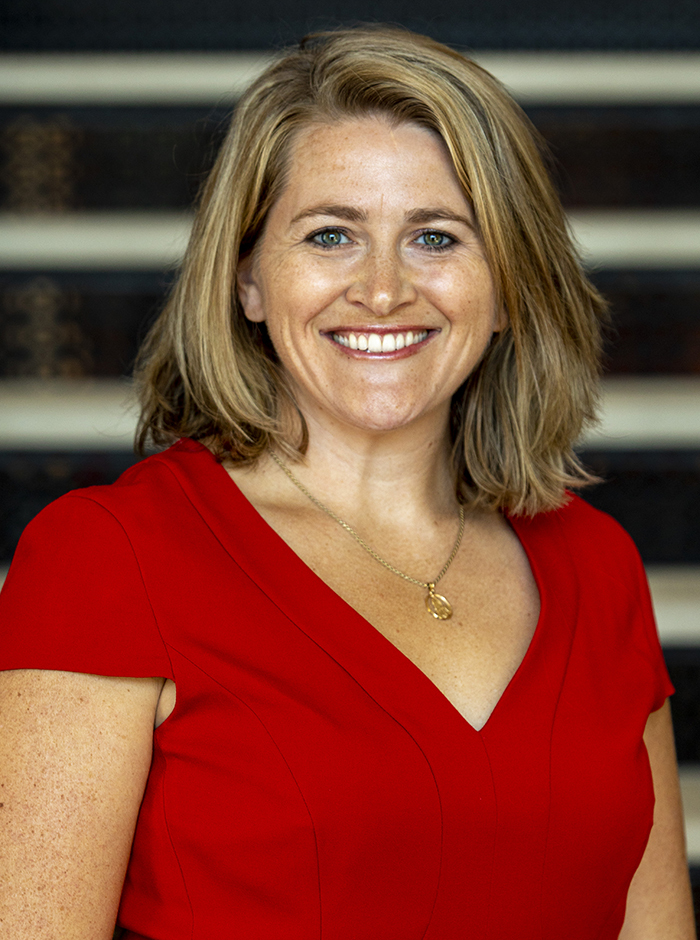
Sophia Magill
Sophia Magill has been named senior advisor to the president and will lead the implementation of strategic initiatives while continuing to manage federal relations. The change is effective Monday, Sept. 12.
Magill has served as director of federal relations since 2015. In her expanded role, she will continue to report directly to President Wendy Wintersteen. Magill's team will be adding two staff members, one to work on federal relations and the other on strategic initiatives.
"We are fortunate to have such an outstanding leader for areas of critical importance to Iowa State's future," Wintersteen said. "Sophia will continue to advance our federal priorities and represent us at the federal level, and now her leadership will help us progress towards the overall strategic goals we've set for the university."
As senior advisor to the president, Magill will lead efforts to advance goals outlined in the university's new 2022-31 strategic plan and other strategic opportunities.
She will be responsible for developing and executing the proposals process laid out in the strategic plan. Annually, the process will seek faculty and staff ideas for projects linked to one or more of the plan's goals. Magill will lead the review of proposals and develop priority recommendations. She will advise the president and senior leaders on funding for the most promising and strategic projects -- ones that move the university closer to achieving its goals.
Magill will ensure faculty and staff leaders provide timely updates and reports on the progress of funded projects. She will track successes and collaborate with the office of strategic relations and communications on capturing success stories of funded projects and disseminating information on strategic plan progress and other strategic projects across campus.
Magill has served for nine years in federal relations in the office of the president. In those responsibilities, she advocates on behalf of the university's federal priorities by promoting research, higher education and science activities and leveraging campus expertise to increase federal support and expand awareness of the university in Washington, D.C.
Magill is engaged in the higher education community, having served as chair of the Council on Governmental Affairs (CGA) at the Association of Public and Land- Grant Universities (APLU). She currently serves as CGA liaison to the Council of Academic Affairs. Before joining the university, she served at the U.S. Agency for International Development.
A native Iowan, Magill earned a bachelor's degree in political science from Iowa State, where she served as student government president, and her master's degree in public administration from the University of Illinois, Chicago.
Meet Jon Perkins, Faculty Senate president
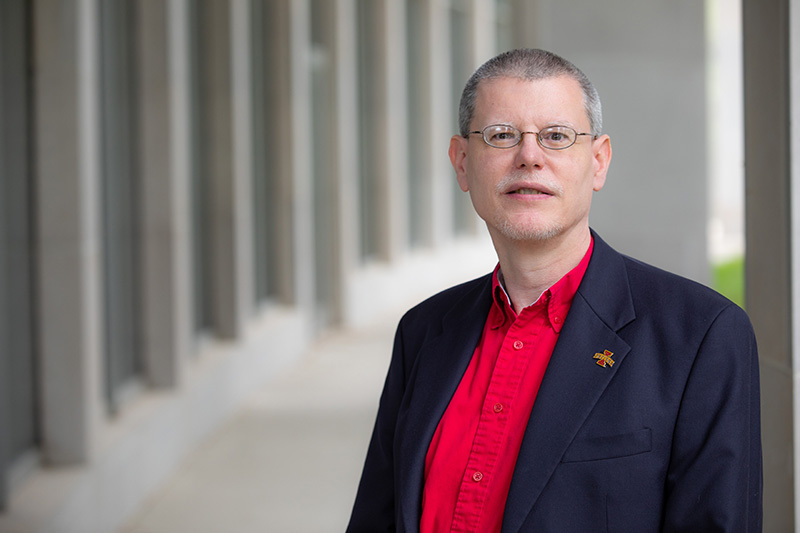
The 2022-23 Faculty Senate president is Jon Perkins, associate professor of accounting. Photo by Christopher Gannon.
The 2022-23 Faculty Senate convenes for the first time next week. Ahead of the Sept. 13 meeting, Inside talked with senate president Jon Perkins about the year ahead.
What are the priorities for your presidency?
I will continue to work on ways to make Iowa State a more inclusive place for all faculty, staff and students. Find ways to get students and faculty re-engaged with the
Years at ISU: 13
Contact: jperkins@iastate.edu, 294-1370
university. Come up with ways to incentivize active engagement, quality and commitment to service on the part of faculty. Help the central administration draft new faculty remote work guidelines, and continue the Faculty Senate’s tradition of strong and open communication with the central administration.
If time permits, I also would like to begin work on drafting a new strategic plan for the Faculty Senate because the current strategic plan is from 2000.
What are the major challenges and issues for senate this year?
Given the continuing resource constraints placed on Iowa State by the Legislature, we need to try to do a better job of informing members of the Board of Regents, the Legislature and the general public about all we do as faculty. Iowa State is worthy of more resources so that we can continue to provide the state with impactful research and high-quality graduates.
What is one thing you wish the faculty understood better about senate?
Shared governance of the university with central administration is a core principle at Iowa State that both Faculty Senate and the central administration take very seriously. While we do not always agree on appropriate courses of action, open and respectful communication is key to both parties working together to improve the university for the benefit of faculty, staff, students and the general public.
What’s the most important lesson you’ve learned from serving on senate?
By its nature, the Faculty Senate consists of individuals with a wide range of viewpoints. This makes representing the faculty well to the central administration and the Board of Regents a challenge. I have learned that to be a good leader, it is important to truly listen to others’ viewpoints, especially when they differ from your own.
Where is your favorite spot to relax or reflect on campus?
I never seem to get enough time to relax or reflect on campus. When weather permits, I have developed an affinity for walking over to the Hub to people-watch and listen to the wind in the trees. It is not much, but it reminds me that there is more to life on campus (and life in general) than my teaching, research and work on the Faculty Senate.
Safety officers, ambassadors fill vital role for ISU police department
The ISU police department, like many across the nation, is searching for qualified individuals to fill open positions. In March, the department began hiring for a new role: public safety officer.
Public safety officers do jobs the public expects ISU police to do but take away from other important law enforcement responsibilities, police chief Michael Newton said.
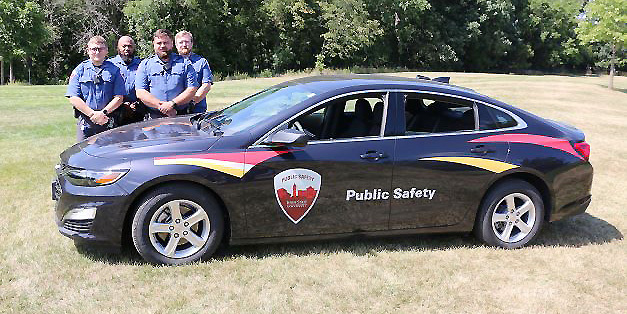
Public safety officers have a distinct uniform and an identifiable car as they work across campus. ISU Police photo.
"We discussed how we could get our officers to focus on the things we need them to and still have an employee that can do the other things the community wants from us," he said. "The safety and security of the campus is paramount to us. We had to find something to fill the voids and give time back to our police officers."
There are five public safety officers on staff with a goal of adding one more. They do not carry guns -- just pepper spray -- and their duties include unlocking cars, patrolling buildings, assisting at events and helping during traffic accidents.
"Police officers are sworn and have the ability to arrest, while the public safety officers are civilian, non-sworn officers who provide additional safety and security," assistant chief Carrie Jacobs said. "The safety officers help police officers relieve the load a little bit as it relates to nonenforcement calls for service."
How to spot a safety officer
The safety officer uniforms are distinct from police officers, with a medium blue shirt and charcoal gray pants with a university-designed red and gray patch featuring the landscape of campus. The officers drive cars striped in ISU colors clearly identified as public safety.
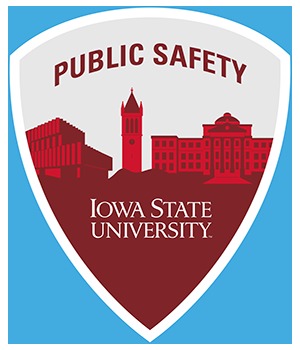
Public safety officer patch
Public safety officers must have two years of experience in security and safety, or a year of post-high school education related to security and safety and one year of experience in the field. Their training is a multistep process that includes defensive tactics and de-escalation, mental health first aid, CPR, geography to become familiar with campus and orientation at Mary Greeley Medical Center.
"We have a contract with Mary Greeley to staff the emergency department and other areas of the hospital. With the addition of the public safety officers, we can have them there instead of a police officer," Newton said.
Safety officers also must obtain Certified Protection Officer certification through the International Foundation of Protection Officers -- required by the state Board of Regents -- within the first six months of employment, Jacobs said.
Newton hopes the program will produce future ISU police officers.
"Some of them have stated an interest in eventually becoming a police officer," he said. "There is not a better way for us to get a feel for them and for them to get a feel for the community."
Campus safety ambassadors
Campus safety ambassadors is a student-run program that also contributes to the safety and security of the campus community. It began when a group of students was chosen in spring 2021 to help with COVID-19 mitigation strategies for a semester.
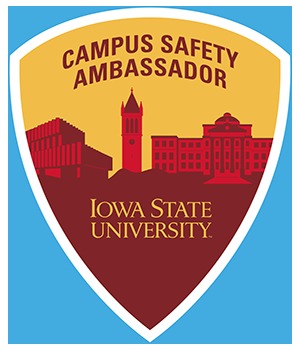
Campus safety ambassadors patch
"Before this, we had community service officers who only worked at night, and the ambassadors were working during the day," Newton said. "We got a lot of good feedback about having these students walk around campus, and university leaders wanted to have the ambassadors continue their work."
The ambassadors combined with the community service officer program -- a longtime student program -- and work in concert with public safety officers. Ambassadors are on campus 24/7 and perform duties from locking and unlocking buildings and cars to fingerprinting. They also are responsible for the SafeRide program.
Their uniform is a light gray shirt with "Campus Safety Ambassador" on the back and navy blue pants. They also have a yellow and red patch on the sleeve of the shirt and carry a radio.
Newton said the ambassadors get a chance to see how the department works, and his officers benefit from hearing student perspectives.
"We really want to make students part of our team when it comes to campus safety," he said. "Having student employees helps us stay in touch with what is happening within the community."
The ambassador program -- which hopes to have 30 students -- is run by four student coordinators who are responsible for recruiting, training and scheduling. Seniors Karley Janecke, Rachel Overla and Delaney Murphy and graduate student Brody Norton coordinate the program, which draws a range of majors from across campus.
"Each coordinator takes a fourth of the ambassadors during a shift that includes day, afternoon, night and Vet Med," said police officer Allison Bell, a mentor to the program. "They ensure everyone is properly trained, handle issues that come up during their shifts and submit proposals to improve the program."
Janecke said interacting with ISU police officers has helped prepare her for a career in law enforcement, but it is an experience any student can learn from.
"You really make a lot of connections doing this job, and a lot of people who interview have been here for a few years and want to be able to give something back to the community," she said. "A lot of students want to be part of something that makes others feel safe on campus."
ISU's state lobbyist gives council overview of her work
Iowa State's state relations officer gave the Professional and Scientific Council an overview of legislative lobbying efforts at the council's Sept. 1 meeting.
President-elect Patrick Wall said he wanted Carolann Jensen to talk about her work to help council members gain a better understanding of how the budget is formed.
Jensen said the process of setting next year's budget is already underway, as the state Board of Regents will consider at a meeting later this month the regent universities' legislative requests for fiscal year 2024, the budget year that begins July 1, 2023. For Jensen, a regents employee who lobbies the Legislature on Iowa State's behalf, the budget request is what guides her over the next several months.
"That's our playbook, what we present to the Legislature," she said.
Once the Legislature convenes in January, the request is presented to several appropriations subcommittees before coming before the larger appropriations committees in the Senate and House. The Senate and House must vote to approve the budget before the governor signs it.
In recent years, Jensen said she's opted for more one-on-one exchanges with state lawmakers during the budget process because subcommittee attendance has been more sporadic since the pandemic. The focus is to highlight the impact of investments in higher education, sometimes with a specific emphasis on the interests and districts of individual legislators. The overriding message is how much Iowa State benefits the entire state, she said.
"What I do is communications and interpretation," Jensen said. "You want to provide people with information that they would find useful that helps you."
Jensen, a self-described rabid Cyclone and an alumna, encouraged council members to contact her if they have something they think legislators should know about. ISU employees should be clear they're speaking for themselves, not the institution, if they contact a legislator directly to advocate for or against legislation, she said. And for the sake of awareness, she'd appreciate a heads up about those conversations.
"I'd like to know if you talk to people," she said.
Iowa State Online hiring
Hiring is ramping up for Iowa State Online, the new centralized unit for supporting online education, associate provost for academic programs Ann Marie VanDerZanden told the council.
The restructuring will eliminate college-level staff positions that support online instruction but increase the overall number of online education staff, VanDerZanden said.
"This is an opportunity to build capacity, and we're confident we'll be able to work with everyone to find an opportunity for them moving forward," she said.
Job descriptions for positions available in the new unit, which will be part of the Center for Excellence in Learning and Teaching (CELT), were shared in individual meetings with affected college-level staff, VanDerZanden said. The positions will be advertised to internal candidates before opening them up to external applicants. Many position advertisements have already posted and can be viewed by searching "ISU find jobs" in Workday.
The internal application process, which isn't limited to employees whose positions are being eliminated, may be streamlined so candidates can seek multiple positions without submitting separate applications, VanDerZanden said. The goal is to conduct interviews throughout September and finish hiring in October so training can begin. All CELT staff will be moving to a new space in Howe Hall in late November or early December. The new unit launches Jan. 1.
CELT director Sara Marcketti will continue to lead the unit as assistant provost and executive director of CELT. Susan Arendt, a professor of hospitality management who has been the online learning faculty fellow in the provost's office since January 2020, will serve as the inaugural director of Iowa State Online. Two other leadership roles also have been filled:
- Lesya Hassall, formerly an instructional technologist for CELT, will be CELT's senior manager of course design and quality.
- Matthew Carver, formerly the course delivery operations manager for Engineering-LAS Online, will be CELT's senior manager of enterprise instructional technology.
VanDerZanden said some Iowa State Online staff may be able to continue working with instructors they had assisted in college-level roles. But one of the benefits of a larger unit is having co-workers to share the workload. Some online support staff have no backup in their current roles.
Strategic initiatives approved
Council members approved their strategic initiatives for 2022-23, which are big-picture and often long-term goals for the council to focus on this year. The initiatives, introduced in a first reading at the August meeting, include employee retention efforts, WorkFlex improvements and additional education for P&S staff about how to engage and thrive on campus.
State funding requests are on regents' September agenda
State funding support for the fiscal year that begins July 1, 2023, is on the agenda when the state Board of Regents meets next week at the University of Northern Iowa. The board's committees will meet Wednesday, Sept. 14, and the full board on Thursday morning, Sept. 15. All public portions of the meeting will be livestreamed on the board's website; the full agenda also is posted there.
Around Oct. 1 each year, the regents submit annual funding requests to the Iowa Legislature on behalf of the universities. As proposed, Iowa State is asking for two increases in operating support in FY2024: a $12 million (6.9%) increase to its general university appropriation and $376,519 in additional biosciences innovation support to fully fund, at $1 million each, the three economic development platforms under ISU management: biobased chemicals, precision and digital agriculture, and vaccines and immunotherapies. University of Iowa oversees the fourth, medical devices.
If funded, Iowa State's general university appropriation would increase to $186.1 million, the highest in more than a decade. Iowa State proposes to use the additional state operating support for:
- Financial aid and support services for first-generation, resident undergraduates, $2 million
- Additional degree and certificate programs in STEM and other high-demand fields to prepare Iowa's workforce, $4 million
- Expanded mental health programming on campus and around the state, $1 million
- Additional research in rare earth materials development and recycling, $3 million
- Retaining high-performing faculty and staff to keep ISU's competitive position in areas such as digital agriculture, water quality and vaccine delivery technologies, $2 million
Building requests
Iowa State will request $62.5 million over four years (fiscal years 2024-27) in capital funds for an estimated $66.5 million second phase of the Veterinary Diagnostic Laboratory at the College of Veterinary Medicine. University funds ($2.7 million) and private gifts ($1.3 million) would cover the remaining cost.
The regents also will request $8.2 million over two years (FY24-25) for a new 75-bed residence hall at the Iowa Lakeside Lab, a 147-acre research and experiential learning campus on West Lake Okoboji owned by the state, used by all three universities and currently managed by the University of Iowa. The new facility would replace 10 unheated cabins used only in the summer and two repurposed motel buildings -- a total of 65 beds -- and allow an additional 300 college students to study at the lab each year.
Adjusted construction budgets
ISU leaders also will seek permission to increase previously approved budgets for two campus projects:
- Therkildsen Industrial Engineering Building (new construction). The request is to increase the project budget 35% (from $54 million to $73.2 million), to maintain the scope of the project while accommodating a projected 25% construction cost increase over 2021 estimates. The original budget anticipated a 10% cost increase. The $19.2 million increase would be covered by private gifts and university funds.
- Union Drive Marketplace dining center (renovation). The request to increase the project budget 53% (from $3.6 million to $5.6 million) reflects both higher construction costs and an additional phase to what was a three-summer project, in order to complete additional venue upgrades and equipment purchases next summer (2023). ISU Dining funds would cover the increase.
A celebration of Iberian history and music
The department of music and theatre is hosting a festival of Iberian music for piano, carillon, organ and harpsichord Thursday-Saturday, Sept. 8-10, in Simon Estes Music Hall and outdoors on central campus. "A Woven Tapestry" will include workshops, lectures and recitals by both guest artists and Iowa State faculty and students. All events are open to the public.
Europe's Iberian peninsula consists primarily of Spain and Portugal.
Associate provost for faculty and professor of Spanish Dawn Bratsch-Prince, whose research interests are in medieval Iberian studies, will give a talk Saturday afternoon on the modern popularity of the Camino de Santiago, medieval Christian pilgrimage routes through Spain and Portugal. She has journeyed on several of them. Her talk begins at 3 p.m. in the Estes Music Hall's recital hall (room 140).
These featured recitals also are in the recital hall unless noted.
- André Lash, St. George's Episcopal Church in The Villages, Lady Lake, Florida, organ, Sept. 8, 7:30 p.m., $5 (free for ISU students)
- ISU keyboard faculty and students, piano, carillon, organ and harpsichord, Sept. 9, 7:30-8:30 p.m., reception follows, $5 (free for ISU students)
- Carol Anne Taylor, The Cathedral Santuario de Guadalupe, Dallas, Texas, carillon, Sept. 10, 11-11:45 a.m., campanile, central campus
- Alexandra Mascolo-David, Central Michigan University, Mount Pleasant, piano, Sept. 10, 4-5:30 p.m., $5 (free for ISU students)
Following Taylor's carillon recital, the campanile will be open for free tours from noon to 1 p.m. on Saturday.
A complete schedule is online.
